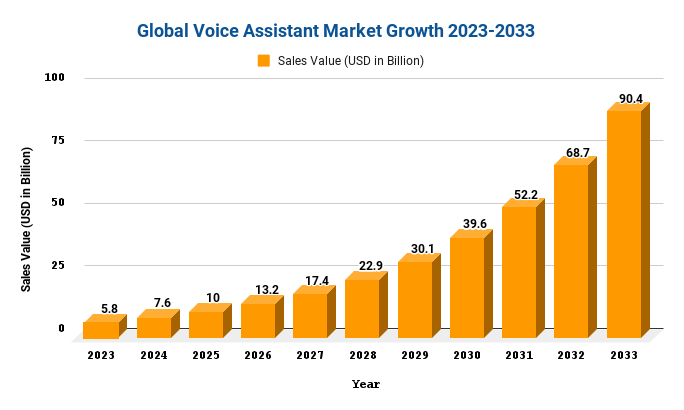Global Voice Assistant Market Projected To Reach USD 90.36 Bn By 2033 | CAGR Of 31.6%

Page Contents
Market Overview
Published Via 11Press: The voice assistant market is an emerging sector of artificial intelligence (AI). It provides consumers with voice-activated digital assistants that can perform various tasks, from playing music or setting reminders to controlling smart home devices and providing information on various subjects.
The voice assistant market is being driven forward by advances in natural language processing (NLP) and machine learning technologies, which enable voice assistants to better comprehend and fulfill user requests. Furthermore, this growth is being fuelled by the growing trend towards smart homes where voice assistants are becoming integrated with home automation systems. The market is primarily driven by the rising adoption of voice-activated devices and voice-based virtual assistants on mobile phones. Major players in this space include Amazon (with Alexa voice assistant), Google (with its Assistant), Apple (Siri) and Microsoft (Cortana).
Overall, the voice assistant market is expected to experience rapid expansion over the coming years due to the increasing popularity of voice-activated devices and advances in AI/machine learning technologies. By 2024, this market could reach several billion dollars, creating lucrative opportunities for both established players and newcomers alike.
Innovation starts with insight, Take a look at the PDF sample of this report: https://marketresearch.biz/report/voice-assistant-market/request-sample/
Key Takeaways
- New Use Cases: Voice assistants are being utilized in a variety of new scenarios, such as remote patient monitoring in healthcare and hands-free driving in automotive applications. This growth in demand has created new market opportunities and expanded existing ones.
- Growing Adoption: The Voice Assistant market is experiencing rapid expansion due to the rising adoption of smart speakers and other voice-activated devices. This growth is being spurred on by voice commands' convenience and ease of use, as well as integration with home automation systems.
- Privacy and Security Concerns: Voice assistants raise privacy and security issues which could stifle growth in the Voice Assistant market if not adequately addressed.
- Advancements in NLP and Machine Learning: Recent advancements in natural language processing and machine learning technologies are making voice assistants smarter and more responsive, providing users with a superior user experience. This trend is fueling growth within the Voice Assistant market as people increasingly rely on voice commands for various tasks.
- Integration with Third-Party Services: Voice assistants are becoming more integrated with third-party services, like music streaming and smart home devices. This presents businesses with new opportunities to reach customers through voice-activated devices.

Regional Snapshot
- North America is the dominant voice assistant market, led by the United States. Here you'll find major players such as Amazon, Google and Apple operating within this space. The market has been driven by strong consumer demand for smart speakers and other voice-activated devices, along with home automation systems' increasing popularity.
- Europe is the second-largest market for Voice Assistants, due to the rise of smart speakers and their integration into smart homes. Countries such as the United Kingdom, Germany, and France lead this sector.
- The Asia-Pacific region is witnessing rapid growth in the Voice Assistants market, led by China and Japan. This development is being spurred on by an increase in smart speaker adoption as well as an uptick in mobile voice assistants.
- The Latin America Voice Assistants market is still developing but is expected to experience rapid expansion over the coming years due to the increasing adoption of mobile voice assistants and their integration into smart homes.
Drivers
- Smart speaker adoption: Devices like Amazon's Echo and Google's Home are becoming more and more popular, fueling demand for voice assistant technology. Smart speakers provide hands-free voice control of a variety of devices and services, quickly becoming a standard feature in many households.
- Integration with Smart Home Systems: Voice assistants are becoming more tightly integrated into smart home systems, allowing users to control their lights, thermostats, security systems, and other devices via voice commands. This integration makes homes more convenient, energy-efficient and secure at the same time.
- Advances in Natural Language Processing (NLP) and Machine Learning: NLP and machine learning technologies are improving the accuracy and responsiveness of voice assistants. These tools enable them to comprehend natural language commands, even those with subtle dialect or accent differences.
- The growing popularity of mobile voice assistants such as Apple's Siri and Google Assistant is propelling demand for this technology in mobile devices. Mobile voice assistants provide hands-free control over devices and services, making them increasingly attractive to users.
- Voice assistants are becoming more prevalent in new uses cases, such as remote patient monitoring in healthcare and hands-free driving in automotive. This has broadened the market and created new growth prospects.
Gain a competitive edge with our market insights: https://marketresearch.biz/report/voice-assistant-market/#inquiry
Restraints
- Data Privacy and Security Concerns: As voice assistants collect data and store it in the cloud, there are concerns around data privacy and security. Customers fear their personal information could be accessed and used without their knowledge or consent.
- Integration with Other Devices and Platforms: Voice assistants can be utilized with a variety of devices and platforms; however, some compatibility issues remain to be addressed. This could restrict their usefulness for consumers.
Opportunities
- Smart Homes: Voice assistants can control smart home devices like lights, thermostats and security systems to make managing one's home simpler.
- E-commerce: Voice assistants make purchasing simpler, allowing businesses to tap into an expanding market of voice shoppers.
- Healthcare: Voice assistants can aid patients in managing their health and wellness by reminding them of appointments, tracking medications, or even checking vital signs.
- Customer Service: Voice assistants can enhance customer service by offering quick answers to frequently asked questions and handling simple tasks like appointment setting or order tracking.
- Automotive: Voice assistants can be integrated into cars to offer hands-free control over navigation, music, and communication functions.
- Education: Voice assistants can be utilized in education to offer personalized learning experiences and assist students with homework and research.
- Entertainment: Voice assistants can enhance entertainment experiences by offering tailored recommendations and controlling media devices.
Challenges
- Privacy Concerns: Voice assistants collect a lot of personal data, leading to concerns about its usage and who has access to it.
- Accuracy and Reliability: Voice assistants must be highly accurate and dependable to provide a great user experience, as errors or misunderstandings can be discouraging for users.
- Integration with Existing Systems: Voice assistants must be integrated with existing systems and platforms in order to be effective, which may present a challenge in complex settings.
- Multiple languages and dialects: Voice assistants must support multiple languages and dialects in order to be effective across a range of global markets.
- Security: Voice assistants can be vulnerable to hacking and other security risks, which may compromise user data and privacy.
- Natural language Processing: Natural language processing (NLP) is an essential technology behind voice assistants, yet it remains challenging for NLP algorithms to comprehend the subtleties of human communication.
- Published Via 11Press: The voice assistant market is fiercely competitive, with major players such as Amazon, Google and Apple dominating it.
Market Segmentation
Segmentation by Technology:
- Speech Recognition
- Speech Recognition System
- Speaker Dependent Systems
- Speaker Independent Systems
- Natural Language Processing (NLP)
- Text-to-Speech Recognition
- Voice Recognition
Segmentation by Application:
- Messenger Bots
- Websites
- Contact Centers
Segmentation by End User:
- Individual Users
- SMEs
- Large Enterprises
Key Players
- Amazon, Inc.
- Google, Inc.
- Apple, Inc.
- Microsoft Corporation
- Samsung Group
- Orange S.A.
- Next IT Corporation
- Creative Virtual Ltd.
- Nuance Communications
- Nokia Networks
Get the insights that matter most to your business: Click Here to Request a research report
Report Scope
| Report Attribute | Details |
| Historical Years | 2017-2022 |
| Base Year | 2022 |
| Estimated Year | 2023 |
| Short-Term Projection Year | 2028 |
| Long-Term Projected Year | 2033 |
Recent Developments
- New Players: In addition to Amazon's Alexa and Google's Assistant, new voices such as Apple's Siri and Samsung's Bixby have gained traction in the voice assistant market.
- Multilingual Support: Voice assistants are becoming more adept at understanding and responding in multiple languages, which is critical for global markets.
- Smart Home Integration: Voice assistants are becoming more and more integrated with smart home devices, allowing users to control everything from their lights to thermostats using voice commands.
- Enhancing Natural Language Processing: Recent advances in natural language processing (NLP) have enabled voice assistants to better comprehend and respond to human speech.
- Voice Commerce: Voice assistants are increasingly being utilized for e-commerce transactions such as ordering groceries or making restaurant reservations.
- Emotion Detection: Many voice assistants are now providing emotion detection capabilities, which could allow for more personalized interactions with users.
- Privacy Features: Companies are introducing new privacy controls, such as the option to delete voice recordings or opt out of data collection, in response to user worries about security.
FAQ
Q: What is the voice assistant market?
A: The voice assistant market refers to digital assistants that utilize natural language processing and voice recognition technology in order to efficiently handle user commands and requests.
Q: Who are the major players in the voice assistant market?
Amazon's Alexa, Google Assistant, Apple's Siri and Samsung's Bixby are some of the prominent names within this space.
Q: What is driving the growth of the voice assistant market?
A: The voice assistant market is being propelled forward by increasing consumer adoption of smart home devices, an increase in e-commerce transactions through voice assistants, and the convenience and personalized experiences provided by voice assistants.
Q: What are the major challenges confronting the voice assistant market?
Privacy worries, accuracy and dependability issues, integration with existing systems, multiple languages/dialects, security threats, natural language processing issues and competition are just a few of the issues affecting this sector.
Q: What are the major applications of voice assistants?
A: Voice assistants have a range of uses, such as smart home control, e-commerce transactions, healthcare services, customer service strategies, automotive technologies, education initiatives and entertainment.
Q: Which regions are driving growth in the voice assistant market?
North America is currently the leading market for voice assistants, followed by Europe and Asia-Pacific. However, analysts forecast that Asia-Pacific will experience the highest growth rates over the coming years.
Q: What are some recent developments in the voice assistant market?
A: Recently, there have been new players such as Samsung's Bixby, improved natural language processing capabilities, emotion detection capabilities and enhanced privacy features.
Q: What is the outlook for the voice assistant market?
A: Overall, analysts anticipate a positive outlook for this technology-driven market in the coming years as it becomes more widespread and integrated into everyday lives. However, challenges related to privacy, accuracy, and security must be overcome in order for this sector to reach its full potential.
Contact us
Contact Person: Mr. Lawrence John
Marketresearch.Biz (Powered By Prudour Pvt. Ltd.)
Tel: +1 (347) 796-4335
Send Email: [email protected]
The team behind market.us, marketresearch.biz, market.biz and more. Our purpose is to keep our customers ahead of the game with regard to the markets. They may fluctuate up or down, but we will help you to stay ahead of the curve in these market fluctuations. Our consistent growth and ability to deliver in-depth analyses and market insight has engaged genuine market players. They have faith in us to offer the data and information they require to make balanced and decisive marketing decisions.